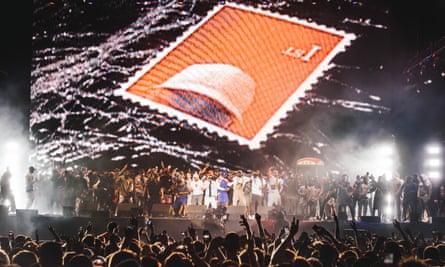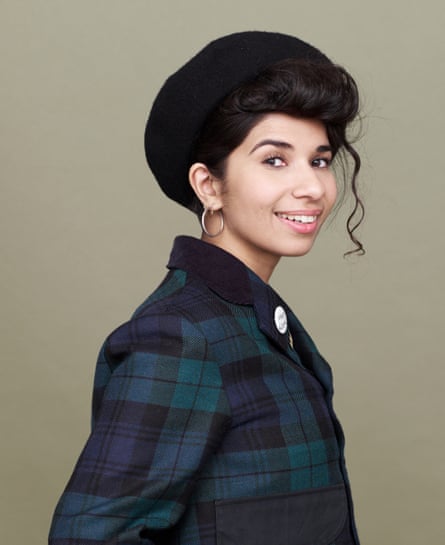A male-dominated culture, exclusivity clauses and a lack of female promoters have all led to gender imbalances on music festival lineups, industry experts have said.
Recent initiatives, such as the PRS Foundation’s Keychange pledge to achieve a 50/50 gender split on lineups by 2022, go some way in tackling the issue, but artists, festival bosses and promoters say more needs to be done.
“There’s still a big imbalance being programmed on festival stages,” said Vanessa Reed, CEO of the PRS Foundation. “The urgency for change has really grown. One of the biggest challenges has been: where do we start?” Last week, Keychange announced that 40 additional festivals and conferences have signed up, bringing the total to 85. Festivals taking part include the Proms, Kendal Calling and Liverpool Sound City.
The announcement comes after an outcry about male-heavy lineups at some of the UK largest’s festivals. In January, Lily Allen and Annie Mac were among the celebrities to criticise Wireless festival – which specialises in rap, grime and hip-hop – for announcing a lineup that included only three female acts across three days of music. In the world of indie, only four of the top 20 acts at this year’s Green Man festival are all-female, while this month’s three-site punk festival Slam Dunk has only two bands featuring women across the 16 on its two biggest stages.

Melvin Benn, the managing director of Festival Republic, the promoter behind Wireless, said the festival – which sold out in 24 hours – had approached “17 or 18 more acts” but was unable to secure them because of touring diaries and record schedules. He added: “Within the genre, there are insufficient women across the board that are strong ticket sellers.”
Green Man director Fiona Stewart, part of the festival’s “roughly 90%” female curatorial team, said: “We want to have more women at the top of the bill, but it has been hard this year and there is an industry-wide issue of fewer female acts available at all levels that has affected the booking process.”
Benn said that this year’s controversy over Wireless was not the first time his festivals have come under fire for their lineups. Reading and Leeds festival was strongly criticised in 2015 for having only nine acts featuring women, but its 2017 edition was launched with 57 men and one woman making up the first 20 announced artists. One of the ways Festival Republic is addressing the problem is through a project launched last year called ReBalance, which offers female artists studio recording time. “I couldn’t think how to address it because the acts weren’t there,” Benn said. “I got the idea to start encouraging more women to start recording music.”
Nabihah Iqbal, a DJ and producer, said the problem lies at the top of the industry. “If there’s no diversity among the decision-makers,” she said, “you won’t see diversity reflected in their decisions.”
Iqbal, who is playing a number of UK festivals this year including Latitude and Field Day, said: “I’ve been doing music full-time for the last five years and I can only think of two instances where I’ve dealt with female promoters.”

Ele Beattie, a booker for Bestival, agreed that more women were needed in decision-making positions within the industry. She said that while there are fewer female headliners to pick from than men, that does not mean fewer women should appear on lineups.
“You can book them for that second headline slot, or headline slot on second biggest stage,” she said. “Support women now so that further down the line they will be that headliner.” Bestival, which has signed for the Keychange pledge, has a 33% representation of women at this year’s festival.
Iqbal said that while she welcomes the Keychange pledge, she remains sceptical that quotas will solve problems endemic to the industry. “Real change only comes when the people in those positions of power change the way they think and they don’t feel like they’re trying to fill a quota for the sake of it,” she said. “If you’re putting together a roster of musical artists, it should be done purely on merit, and gender shouldn’t be a part of it.”
Yaw Owusu, music curator at the Liverpool international music festival, agreed and said that when he books the festival, he aims for diversity over box-ticking. “I come from a minority demographic myself,” he said. “I’m very cautious to avoid tokenism.”
Owusu added that for a smaller festival, one of the biggest challenges in adding women to the lineup is exclusivity clauses in contracts that prevent artists from playing events in the same region if they have been booked by the larger festivals.
“As an independent festival, you can’t really get to some of those bigger artists because they’re locked up in exclusivity clauses,” he said. “Every year when I put my list together, I’ve got a majority female artists in my top 20, but when it comes down to it, I might only be able to get three or four through the door.”
Experts agreed that the need for change has gathered steam in 2018, but that the problem is far from new. According to data gathered by Pitchfork, female representation at music festivals has increased to 19% this year from 14% in 2017. Last year, a BBC study of 14 major UK festivals for the last decade found out of 660 headline appearances, only 37 were all-female acts.
“Festivals are meant to promote a utopia where the regular rules don’t apply,” Beattie said. “I want to see that reflected in the lineups. It’s really important, as promoters and festival bookers, to represent the world that we want to see.”

Comments (…)
Sign in or create your Guardian account to join the discussion